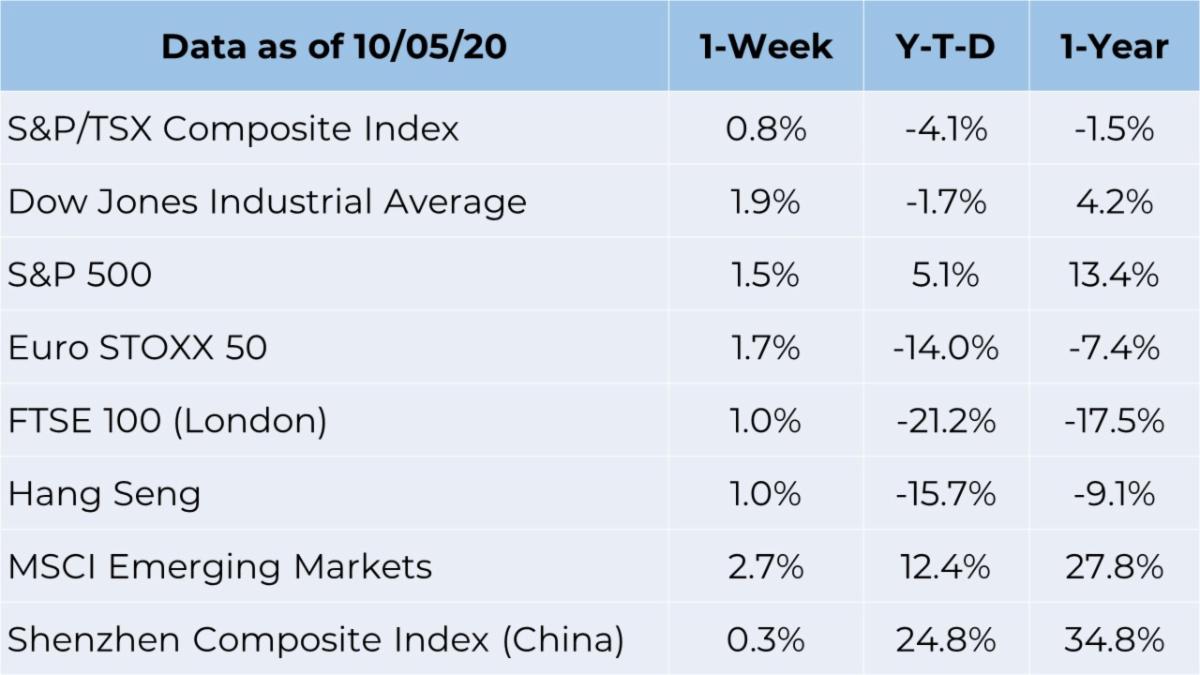Weekly Market Commentary October 7 2020
The Markets
Last week, the third quarter of 2020 came to an end – and the fourth quarter delivered a doozy of an October surprise.
President Trump has the coronavirus
On Friday the world awoke to the news that U.S. President Donald Trump had contracted the novel coronavirus. Financial markets responded with relative equanimity. After a brief sell-off on Friday, major U.S. indices finished the week, and the third quarter, higher.
Market enthusiasm cooled in September
North American stock markets moved higher in July and August. Then, in early September, investors became skittish and major indices recorded losses for several weeks. The surge of uncertainty may have resulted from changing vaccine expectations, concerns about earnings, fears of a disputed election in the United States, and lack of new stimulus, reported Ben Levisohn of Barron’s.
The U.S. Federal Reserve committed to low rates for a long time
The Federal Reserve’s changing policies may have had an influence on markets, as well. The Fed intends to keep interest rates near zero for the foreseeable future. The Federal Open Market Committee (FOMC) statement provided a big picture explanation, “The path of the economy will depend significantly on the course of the virus. The ongoing public health crisis will continue to weigh on economic activity, employment, and inflation in the near term, and poses considerable risks to the economic outlook over the medium term.”
Yields on 10-year U.S. Treasuries moved in a narrow range during the quarter, finishing near where they started.
Stimulus talks resumed last week
Treasury yields rose and stock markets perked last week when U.S. Congress resumed stimulus talks. Investors expect $1.3 to $1.5 trillion in new stimulus, according to BCA Research cited by Kiplinger’s.
Additional stimulus measures were expected early in the third quarter, after CARES Act provisions ran dry in July. However, better-than-expected economic data and a reluctance to increase the burgeoning budget deficit made some in Congress adopt a wait-and-see approach, reported Victor Reklaitis of MarketWatch.
By last Friday, stimulus negotiations appeared to have stalled again. However, there were new calls for action over the weekend, following Friday’s weaker-than-expected employment report, according to Jacob Pramuk of CNBC.
Unemployment is steadily returning to normal levels
Throughout the third quarter, employment improved steadily. From 12.3% unemployment in Canada going into July, unemployment had fallen to 10.2% by the end of August. September numbers have not yet been released for Canada yet, but the U.S. unemployment rate fell to 7.9% by the end of last month.
Economic growth improved during the third quarter
During the second quarter (April through June), both the U.S. and Canadian economies shrank by about a third. Data for third quarter economic growth is not yet available for either country, but it is expected to show a significant improvement. The Atlanta Federal Reserve’s GDPNow estimates third quarter growth in the U.S. could be as high as 34.6 percent.
While a double-digit rebound would be welcome news, Aaron Weitzman of The Bond Buyer pointed out a 34.6 percent rebound would not be enough to offset the contraction. The economy needs to grow by around 50 percent to get back to even.
Volatility is likely to continue
Global markets are likely to continue to be volatile through the end of 2020. If you have any questions or concerns about your investment portfolios or current market volatility, please don’t hesitate to give us a call.

Source: Refinitiv
The very best wrong test answers
Almost everyone has come across a test question they couldn’t answer. Some ingenious souls provide their teachers with some humor instead. British author Richard Benson asked teachers to share their favorite wrong test answers, and he shared a few with Business Insider:
Q: Describe what is meant by “forgetting.”
A: I can’t remember.
Q: What is a nitrate?
A: It is much cheaper than a day rate.
Q: Upon ascending to the throne, the first thing Queen Elizabeth II did was to…
A: Sit down.
Q: Where was the Declaration of Independence signed?
A: At the bottom.
Weekly Focus – Think About It
You pay a very high price for a cheery consensus. It won't be the economy that will do in investors; it will be the investors themselves. Uncertainty is actually the friend of the buyer of long-term values.”
Warren Buffett, Investor and philanthropist
Best regards,
Eric Muir
B.Comm. (Hons.), CIM®, FCSI
Portfolio Manager
Tracey McDonald
FCSI, DMS, CIM®
Portfolio Manager


